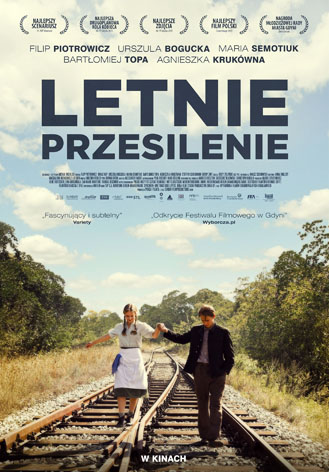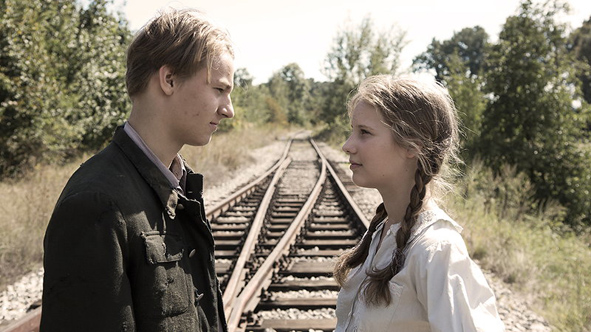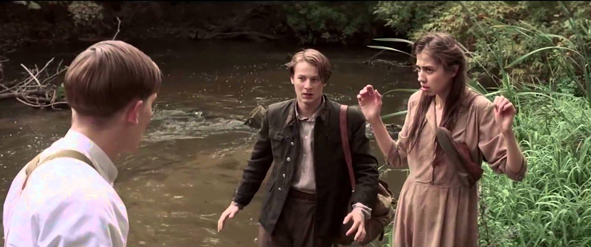
Australian
premiere
Director & Screenwriter:
Michał Rogalski
Production:
Prasa i Film (Poland)
Sunday Filmproduktions GmbH (Germany)
Producers:
Maciej Strzembosz, Ewa Borguńska, René Frotscher, Eva-Marie Martens
Cinematography:
Jerzy Zieliński
Cast:
Filip Piotrowicz, Jonas Nay, Urszula
Bogucka, Maria Semotiuk,
Bartłomiej Topa, Gerdy Zint,
Agnieszka Krukówna
Genre:
Historical drama
Poland, Germany 2014
Duration: 96 minutes

|
|

What could bring
together a young Polish peasant and his neighbor the daughter of
a wealthy landholder - a young German gendarme and a Jewish girl from
Warsaw? Love? Friendship? Coincidence?
1943, The Polish countryside. The war has been going on for four years
now. After the defeat at Stalingrad, younger and younger Germans are
recruited into the army. This is how Guido - a sensitive seventeen-year-old
from Hamburg - ends up in Poland. In this hostile environment, he
is trying to find a refuge and shield himself from the brutality of
the war and the coarse world of his older colleagues - gendarmes.
In a forgotten attic, he listens to forbidden music - jazz - and he
dreams. At the same time, his contemporary, Romek, who has lost his
father, is helping his mother as a railway employee. As the engine-drivers
assistant, every day, at the side track, he sees things taken away
from Jews transported to death camps. He does not understand the tragedy
- he looks at it indifferently. Whenever an opportunity arises, he
attempts to take away the stolen items from the German gendarmes,
although they are often useless - such as an old phonograph. He is
not a fighter. He is interested in girls - mostly in Franka, the daughter
of a wealthy farmer. Guido finds her attractive, too. Romek meets
a girl who has escaped from a train car transporting Jews to a death
camp - Bunia; at first, fearful of the consequences, he attempts to
make her go away. Bunia does not want to leave. She hopes that the
boy can save her. Eventually, a bond forms between the two. Guido,
feeling lost, gets closer to Franka. Listening to forbidden jazz,
they make love in the attic. The commander finds their hiding place.
Guido must choose now - will he save himself or help Franka?
|
|


Rok
1943. Polska prowincja. Wojna trwa już cztery lata. Po klęsce pod Stalingradem
coraz młodsi Niemcy trafiają do armii. Tak w Polsce znalazł się Guido,
wrażliwy, pochodzący z Hamburga siedemnastolatek. W obcej rzeczywistości
próbuje stworzyć sobie azyl przed brutalnością wojny i prostackim światem
jego starszych kolegów, żandarmów. Na zapomnianym przez wszystkich strychu
słucha zakazanej muzyki - jazzu i oddaje się marzeniom. W tym samym
czasie jego rówieśnik, Romek, po stracie ojca pomaga matce, pracując
na kolei. Jako pomocnik maszynisty codziennie na bocznicy widzi rzeczy
odebrane wywożonym do obozów zagłady Żydom. Nie rozumiejąc istoty tragedii,
patrzy na to obojętnie. Kiedy nadarzy się okazja, stara się odebrać
niemieckim żandarmom skradzione Żydom rzeczy, często nieprzydatne -
jak stary gramofon. Nie ma charakteru bojownika. Bardziej zajmują go
dziewczyny, a najbardziej Franka, córka zamożnego gospodarza. Ta sama
wiejska dziewczyna podoba się Guido. Romek spotyka uciekinierkę z transportu,
Żydówkę Bunię, którą najpierw, bojąc się konsekwencji, stara się za
wszelką cenę odpędzić. Bunia nie chce odejść. Wie, że sama nie przetrwa.
Szuka w rówieśniku ratunku. Z czasem rodzi się między nimi więź. Zagubiony
Guido zbliża się do Franki. Przy dźwiękach zabronionego jazzu kochają
się na strychu. Kryjówkę odkrywa komendant. Guido musi wybrać - ratować
siebie czy pomóc France?
|
|




